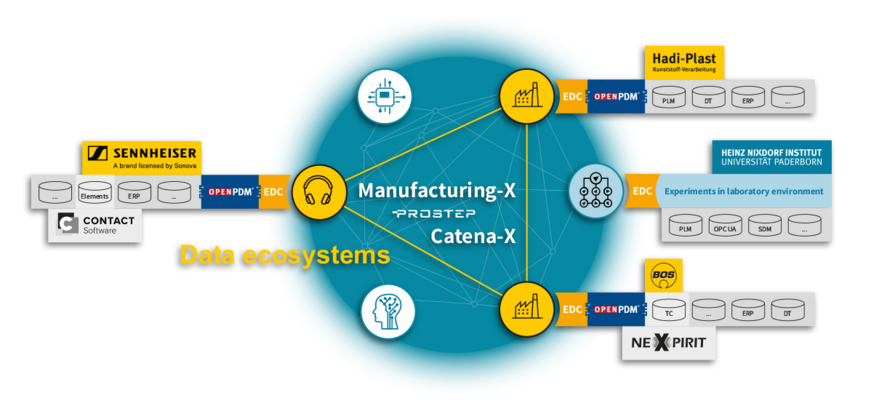Sustainability
STARTS IN
PRDUCT DEVELOPMENT



Challenges
- The costs involved in manufacturing, maintaining and recycling a product are determined as early as in the product development phase. This phase also determines the ecological footprint of a product during production, product use and its feedback into circular value networks. Often only incomplete and sometimes low-quality data is available in this context.
- Companies therefore need methods and tools that allow them to make decisions regarding the sustainable production and operation of their products at an early stage, while at the same time taking account of constantly changing laws and regulations, and enable circular value creation.
- In order to assess the ecological footprint of a product, it is necessary that sustainability-relevant information about the entire production and supply chain be collected and made available for product development. This can be done using data ecosystems, for which tools and methods that enable companies to use them must be made available.
PROJECT GOALS
- Development of methods and tools for model-based, predictive and flexible decision support in product development.
- Promotion of ecological and circular value creation by means of more sustainable products.
- Utilization of trustworthy data ecosystems for the secure and efficient provision and use of sustainability-relevant information.
Project partners
The IT solution providers CONTACT, Nexpirit and PROSTEP are implementing the Decide4ECO methodology that will provide support for sustainable product development in demonstrators and integrating this in data ecosystems. | |
| The industrial companies BOS, Sonova and Hadi-Plast are contributing their requirements, testing the demonstrators and gaining experience with data ecosystems. | |
| The Heinz Nixdorf Institute is focusing on method development and information modeling as well as creating a laboratory environment.. | |
| Grant Thornton provides advice on the legal structure of data ecosystems and compliance with the Data Act and Data Governance Act. The Dutch partner Brainport Industries provides support for the dissemination of the project results in the Netherlands. |
Project results
As part of Decide4Eco, PROSTEP will integrate Eclipse Dataspace Components (EDC) in its PLM integration platform OpenPDM with the aim of making data from PLM, ALM and ERP systems available in data spaces such as Manufacturing-X and Catena-X using the Asset Administration Shell (AAS). Use by other Manufacturing-X projects is possible during the project. Please contact us. PROSTEP is also expanding its digital thread solution OpenCLM to include the option of enriching the digital thread with sustainability-related information and displaying this information in clearly organized dashboards. It is also developing solutions for the chatbot-supported generation of product passports.
Contact Software and Nexpirit will be implementing new functions for sustainability analyses and data ecosystem integration in their solutions to provide companies with support for the collaborative development of sustainable products and enable them to make decisions about sustainability-relevant product features earlier and with a higher level of certainty.
The application partners will use the methods and IT solutions to develop more sustainable products. They will also be in a position to participate in data ecosystems in the future.
The IT solution providers will use the experience they gain from the project to expand their consulting services in the direction of eco-compliance and end-to-end management of sustainability information and enter into strategic partnerships with the aim of utilizing the results of the project.
The Heinz Nixdorf Institute is designing a methodology for systematic and flexible decision support for the creation of circular, resilient and transparent value networks. Focus is being placed on a basic reference process model, information models including the mapping of information quality and algorithms for impact analyses on system models. The institute's Smart Automation Laboratory serves as an experimental environment for standards and software components in the demonstrator. The results are incorporated into research and teaching.
Demonstrator
Initial implementation of a demonstrator in order to quickly gather experience.
The project partners continuously implement the project results in a demonstrator, which is validated by the application partners. A demonstrator for the product carbon footprint (PCF) will be implemented first to quickly gain experience with data ecosystems such as Manufacturing-X and Catena-X.

Open to new partners
Companies interested in testing the project results can participate in the project as associated partners. This provides them with insight into the Decide4ECO methodologies and access to our demonstrators at an early stage. We expect them to provide feedback on the Decide4ECO solutions and actively participate in discussions.
Please feel free to contact us.
Project details


Project name: | Decide4ECO |
|---|---|
| Project volume: | approx. 6 million euros |
| Duration: | April 2024 to September 2026 |
| Funding initiative: | Manufacturing-X |
| Funded by: | German Federal Ministry for Economic Affairs and Climate Action |
| Consortium head: | PROSTEP AG |
Contact

Dr.-Ing. Martin Holland
martin.holland@prostep.com

Dr.-Ing. Jens Pottebaum
jens.pottebaum@hni.upb.de